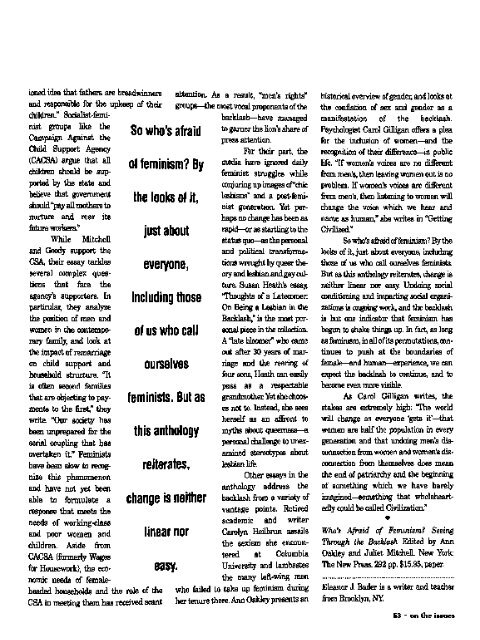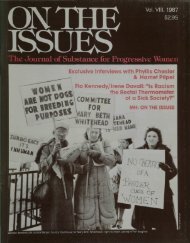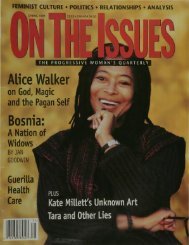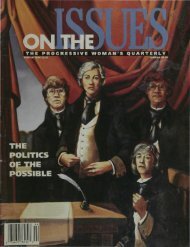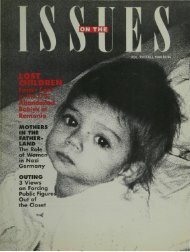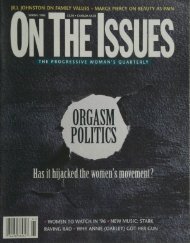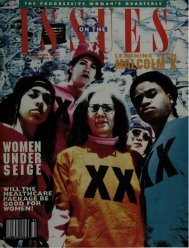women histories, incest sexual abuse. institutionalized. But what if ...
women histories, incest sexual abuse. institutionalized. But what if ...
women histories, incest sexual abuse. institutionalized. But what if ...
You also want an ePaper? Increase the reach of your titles
YUMPU automatically turns print PDFs into web optimized ePapers that Google loves.
ioned idea that fathers are breadwinners<br />
and responsible for the upkeep of their<br />
children." Socialist-feminist<br />
groups like the<br />
Campaign Against the<br />
Child Support Agency<br />
(CACSA) argue that all<br />
children should be supported<br />
by the state and<br />
believe that government<br />
should "pay all mothers to<br />
nurture and rear its<br />
future workers."<br />
While Mitchell<br />
and Goody support the<br />
CSA, their essay tackles<br />
several complex questions<br />
that face the<br />
agency's supporters. In<br />
particular, they analyze<br />
the position of men and<br />
<strong>women</strong> in the contemporary<br />
family, and look at<br />
the impact of remarriage<br />
on child support and<br />
household structure. "It<br />
is often second families<br />
that are objecting to payments<br />
to the first," they<br />
write. "Our society has<br />
been unprepared for the<br />
serial coupling that has<br />
overtaken it." Feminists<br />
have been slow to recognize<br />
this phenomenon<br />
and have not yet been<br />
able to formulate a<br />
response that meets the<br />
needs of working-class<br />
and poor <strong>women</strong> and<br />
children. Aside from<br />
CACSA (formerly Wages<br />
for Housework), the economic<br />
needs of femaleheaded<br />
households and the role of the<br />
So who's afraid<br />
of feminism? By<br />
the looks of it,<br />
just about<br />
everyone,<br />
including those<br />
of us who call<br />
ourselves<br />
feminists. <strong>But</strong> as<br />
this anthology<br />
reiterates,<br />
change is neither<br />
linear nor<br />
easy.<br />
attention. As a result, "men's rights"<br />
groups—the most vocal proponents of the<br />
backlash—have managed<br />
to garner the lion's share of<br />
press attention.<br />
For their part, the<br />
media have ignored daily<br />
feminist struggles while<br />
conjuring up images of "chic<br />
lesbians" and a post-feminist<br />
generation. Yet perhaps<br />
no change has been as<br />
rapid—or as startling to the<br />
status quo—as the personal<br />
and political transformations<br />
wrought by queer theory<br />
and lesbian and gay culture.<br />
Susan Heath's essay,<br />
"Thoughts of a Latecomer:<br />
On Being a Lesbian in the<br />
Backlash," is the most personal<br />
piece in the collection.<br />
A "late bloomer" who came<br />
out after 30 years of marriage<br />
and the rearing of<br />
four sons, Heath can easily<br />
pass as a respectable<br />
grandmother. Yet she chooses<br />
not to. Instead, she sees<br />
herself as an affront to<br />
myths about queerness—a<br />
personal challenge to unexamined<br />
stereotypes about<br />
lesbian l<strong>if</strong>e.<br />
Other essays in the<br />
anthology address the<br />
backlash from a variety of<br />
vantage points. Retired<br />
academic and writer<br />
Carolyn Heilbrun assails<br />
the sexism she encountered<br />
at Columbia<br />
University and lambastes<br />
the many left-wing men<br />
who failed to take up feminism during<br />
CSA in meeting them has received scant her tenure there. Ann Oakley presents an<br />
historical overview of gender, and looks at<br />
the conflation of sex and gender as a<br />
man<strong>if</strong>estation of the backlash.<br />
Psychologist Carol Gilligan offers a plea<br />
for the inclusion of <strong>women</strong>—and the<br />
recognition of their d<strong>if</strong>ference—in public<br />
l<strong>if</strong>e. "If <strong>women</strong>'s voices are no d<strong>if</strong>ferent<br />
from men's, then leaving <strong>women</strong> out is no<br />
problem. If <strong>women</strong>'s voices are d<strong>if</strong>ferent<br />
from men's, then listening to <strong>women</strong> will<br />
change the voice which we hear and<br />
name as human," she writes in "Getting<br />
Civilized."<br />
So who's afraid of feminism? By the<br />
looks of it, just about everyone, including<br />
those of us who call ourselves feminists.<br />
<strong>But</strong> as this anthology reiterates, change is<br />
neither linear nor easy. Undoing social<br />
conditioning and impacting social organizations<br />
is ongoing work, and the backlash<br />
is but one indicator that feminism has<br />
begun to shake things up. In fact, as long<br />
as feminism, in all of its permutations, continues<br />
to push at the boundaries of<br />
female—and human—experience, we can<br />
expect the backlash to continue, and to<br />
become even more visible.<br />
As Carol Gilligan writes, the<br />
stakes are extremely high: "The world<br />
will change as everyone 'gets it'—that<br />
<strong>women</strong> are half the population in every<br />
generation and that undoing men's disconnection<br />
from <strong>women</strong> and <strong>women</strong>'s disconnection<br />
from themselves does mean<br />
the end of patriarchy and the beginning<br />
of something which we have barely<br />
imagined—something that wholeheartedly<br />
could be called Civilization."<br />
•<br />
Who's Afraid of Feminism? Seeing<br />
Through the Backlash Edited by Ann<br />
Oakley and Juliet Mitchell. New York:<br />
The New Press. 292 pp. $15.95, paper.<br />
Eleanor J. Bader is a writer and teacher<br />
from Brooklyn, NY.<br />
53 - on the issues


